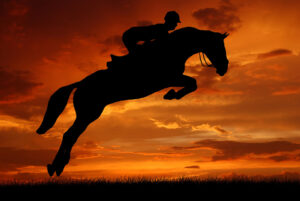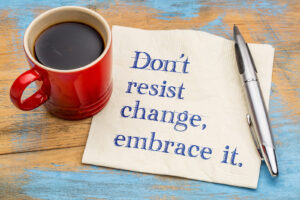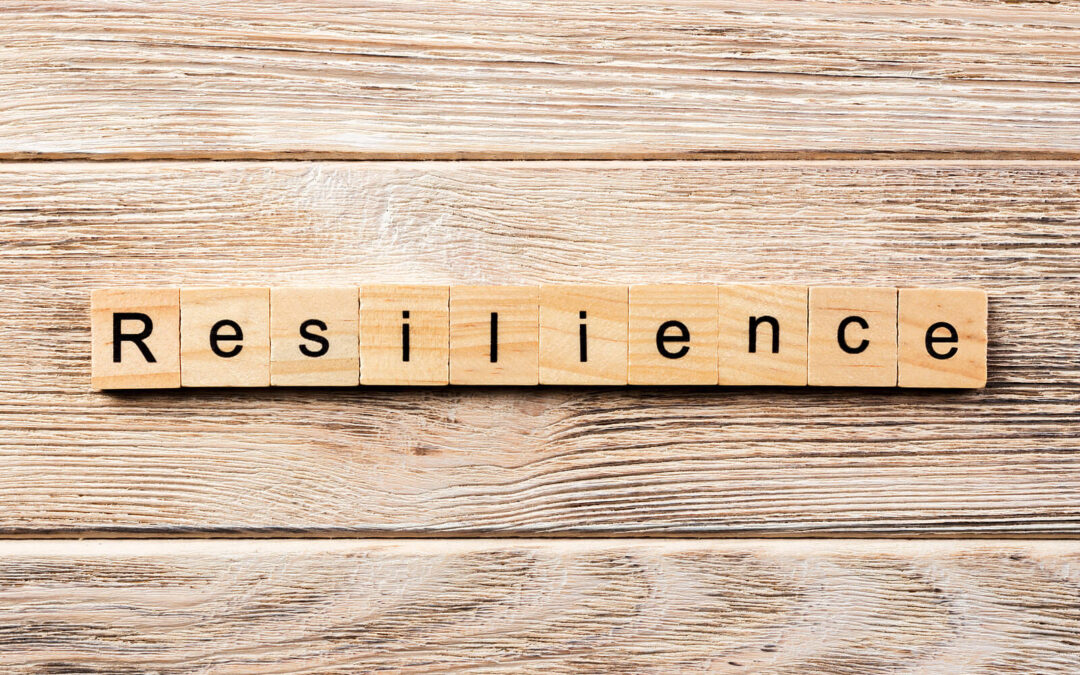Riding horses is something that I have done for as long as I can remember.
 Horses have been a part of my life since I could crawl to the barn. This love of horses and riding and showing horses has been a constant change in my life. Throughout all my life transitions my horses have been there for me. I have also had to deal with lots of transitions in my riding career. Equestrian sports are a demanding discipline requiring physical skill and mental resilience. Whether it’s a change in competition level, transitioning to a new horse, or even the inevitable aging process, the transitions within equestrian sports can profoundly affect a rider’s mental health. So, in this article, we will look at some of the types of transitions riders go through and ways to help riders make a smooth transition to the next level stage or phase in the riding. This article may speak to riders specifically; however, these skills will work for our many life transitions.
Horses have been a part of my life since I could crawl to the barn. This love of horses and riding and showing horses has been a constant change in my life. Throughout all my life transitions my horses have been there for me. I have also had to deal with lots of transitions in my riding career. Equestrian sports are a demanding discipline requiring physical skill and mental resilience. Whether it’s a change in competition level, transitioning to a new horse, or even the inevitable aging process, the transitions within equestrian sports can profoundly affect a rider’s mental health. So, in this article, we will look at some of the types of transitions riders go through and ways to help riders make a smooth transition to the next level stage or phase in the riding. This article may speak to riders specifically; however, these skills will work for our many life transitions.
Transitions are a constant and integral part of the journey in equestrian sports. Some of the most common transitions include:
Change in Competition Level:
As riders progress in their careers, they often move up to higher levels of competition. This can mean transitioning from local shows to national or international events, each with increasing pressure and expectations. This can also be simply moving up a different jump height in showing, so moving from 2ft to 3ft jumps. It can also move down a level, such as jumping or showing. Moving up and down the levels can be due to injury or a change of horses or lifestyle.
Switching Horses:
Unlike other sports where athletes rely solely on their abilities, equestrian sports require a strong partnership with a horse. This partnership takes time, and we will need to change our timeline and expectations for this horse as we develop this partnership. If we had an extraordinary partnership with a horse, we may want this same relationship with our next horse. If this does not happen in the expected timeline, we may start to resent or feel frustrated with the horse or ourselves for being unable to get it right immediately. This frustration can lead to dips in confidence and other frustrations. Learning to be patient with ourselves and this relationship is essential to make this transition go quickly.
Aging and Retirement:
As riders age, as we all do, we may face the reality of changing physical capabilities and how this affects our expectations of what we can do and accomplish. Yet another unique characteristic of riding is that it can be very forgiving of the aging process if we take care of ourselves. This is evident in the most recent Olympics, with one of the US riders, Laura Kraut, competing and winning a silver medal was 58 years old. This is a huge accomplishment for her, and all riders as it shows age is not the defining factor in riding.
Injury Recovery:
Equestrian sports carry a high risk of injury, both for riders and horses. Recovering from an injury and returning to the sport can be a daunting transition that affects both horse and rider. Again, how we approach and say to ourselves about the injury will significantly impact the recovery. If we say negative things to ourselves about the injury, “I will never be able to ride again” or “ My horses will never recover,” we will likely take much longer to recover, potentially leading to erosion of confidence in ourselves and our horses.
Balancing Life and Sport:
Many riders, especially amateurs, must balance their equestrian pursuits with other responsibilities such as work, family, and education. All of us face this, as well as managing time, expectations, responsibility, and relationships in the different parts of our lives that are important to us.
Each of these transitions involves significant changes that can disrupt a rider’s routine, goals, and sense of self, leading to various mental health challenges. The mental health challenges that riders face during transitions in equestrian sports are varied and can have long-lasting effects if not adequately addressed.
Some of the key challenges related to mental health include:
Performance Anxiety:
Moving up to a higher level of competition often comes with increased pressure to perform well. Riders may experience performance anxiety, characterized by excessive worry, self-doubt, and fear of failure. This anxiety can hinder their ability to perform at their best and enjoy the sport. Learning to change what we say to ourselves and how our nervous system works and affects how we think is essential to managing performance anxiety.
Loss of Confidence:
 Switching to a new horse can be difficult, particularly if the new partnership does not immediately click. Riders may struggle with feelings of inadequacy or frustration, leading to a loss of confidence in their abilities. Riders and everyone need to be mindful of loss of confidence to ensure it does not take over during a transition.
Switching to a new horse can be difficult, particularly if the new partnership does not immediately click. Riders may struggle with feelings of inadequacy or frustration, leading to a loss of confidence in their abilities. Riders and everyone need to be mindful of loss of confidence to ensure it does not take over during a transition.
Identity Crisis:
For many riders, equestrian sports are not just a hobby but a core part of their identity. When faced with retirement, aging, or a significant injury, riders may struggle to adjust to the transition or the changes. Learning to change how we think about ourselves is essential as we transition in life or sports.
Depression and Grief:
Losing a beloved horse due to sale, injury, or death can lead to profound grief and sadness. This loss can trigger depression, particularly if the rider feels isolated or unsupported during the grieving process. This is also true in the non-equestrian world. The loss of a spouse, sibling, parent, friend, or job can lead to depression without support from family, friends, or therapists.
Burnout:
Balancing the demands of training, competition, and personal life can lead to burnout, characterized by physical and emotional exhaustion. Riders who experience burnout may lose their passion for the sport and feel overwhelmed by their responsibilities. Burnout happens to anyone when we do not take time to care for ourselves by setting limits for what we can do and permitting ourselves to step back at times.
Fear and Trauma:
Equestrian sports come with inherent risks, and a traumatic event such as a fall or a severe injury can leave lasting psychological scars. Riders may develop a fear of riding or competing, which can be challenging to overcome.
Successfully navigating transitions in equestrian sports requires a combination of self-awareness, support, and proactive mental health strategies. Seeking the aid of a therapist is often helpful in making transitions feel more manageable.
Things a life transitions therapist can help with during the transitions are listed below.
Open Communication:
Talking openly about feelings and concerns with trainers, fellow riders, or therapists can provide valuable support. It’s essential to recognize that struggling with challenges is not a sign of weakness but a normal response to stress and change.
Setting Realistic Goals:
Setting realistic and achievable goals during transition can help riders maintain focus and motivation. Breaking down larger goals into smaller, manageable steps can make the process less overwhelming and more rewarding. Learning about process and outcome goals can be beneficial in changing the focus of goals and how we think about ourselves.
Mindfulness Techniques:
Practices such as mindfulness, meditation, and deep breathing exercises can help riders manage anxiety and stress. These techniques can be instrumental before competitions or during challenging adjustment periods.
Embracing Flexibility:
Flexibility in mindset and approach is crucial for adapting to new circumstances. Whether adjusting to a new horse’s quirks or finding a new role within the sport as one ages, being open to change can help riders navigate transitions with less resistance and more positivity.
Change is constant, and sometimes it is subtle, and sometimes it is drastic.
Transitions are changing in our lives, whether in sports, family work, or relationships. Therapy can help us develop a more helpful viewpoint about the changes happening or coming.
EMDR can be helpful not only in reprocessing traumatic memories and recovering from trauma but it can also be conducive to changing how one thinks about stressful situations such as competition. We can give ourselves additional resources to use before and after the competition.
Cognitive behavioral therapy can help change our negative thoughts about ourselves. We can learn how what we are saying to ourselves affects our ability to do specific tasks and how we think about ourselves and the world. Learning skills to change our thoughts can be invaluable to managing change and transitions.
 Equine therapy can also help manage transitions, as experiential treatment allows us to develop relationships with horses. Horses are very intuitive and often reflect the struggles and challenges we face. They allow us to find answers for ourselves without judging. Equine therapy is usually effective with trauma as we can find ways of seeing ourselves and our relationships in a different way. The horses allow us to tell our story with compassion and acceptance.
Equine therapy can also help manage transitions, as experiential treatment allows us to develop relationships with horses. Horses are very intuitive and often reflect the struggles and challenges we face. They allow us to find answers for ourselves without judging. Equine therapy is usually effective with trauma as we can find ways of seeing ourselves and our relationships in a different way. The horses allow us to tell our story with compassion and acceptance.
Transitions in equestrian sports, whether moving up in competition, switching horses, or adjusting to aging and retirement, can profoundly impact a rider’s mental health.
Riders can navigate these transitions with resilience and confidence by understanding these challenges and employing effective coping strategies. It’s also essential for the equestrian community, including coaches, trainers, and peers, to foster a supportive environment that prioritizes mental health alongside physical performance. After all, the true joy of equestrian sports lies not just in the achievements but in the journey and the partnerships forged along the way.
Start Working With an Equine Sports Therapist in Richmond, VA, and Across the State
If you are looking for a way to help with transitions in your life or riding or in life outside of sports, I would be happy to help you navigate the changes that can come your way. Gray Horse Counseling is happy to offer support with equine-assisted psychotherapy and a variety of other services. You can start your therapy journey today by following these simple steps:
- Schedule a free consultation to see how therapy can help you.
- Check out my FAQs and read more about me
- Start navigating transitions in healthier ways!
Other Services Offered with Gray Horse Counseling
Equine-assisted therapy isn’t the only service that Gray Horse Counseling offers. I am happy to offer a variety of in-person and online services to support you on your mental health journey. I’m happy to offer in-person help in Powhatan, Richmond, and online in Virginia. Other services include individual therapy, anxiety therapy, group therapy, EMDR therapy, clinical supervision, equine therapy, and depression treatment. Check out my FAQs, read about me, and contact me today to get the help you deserve!

